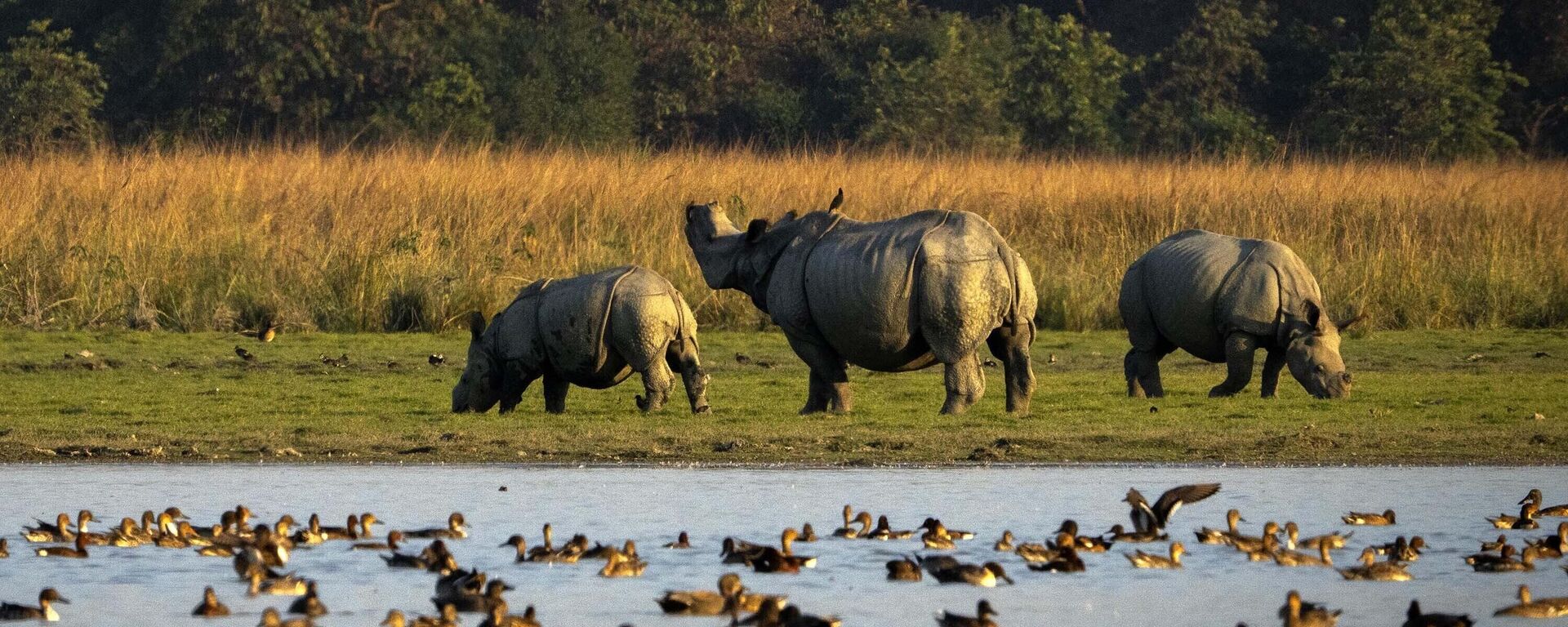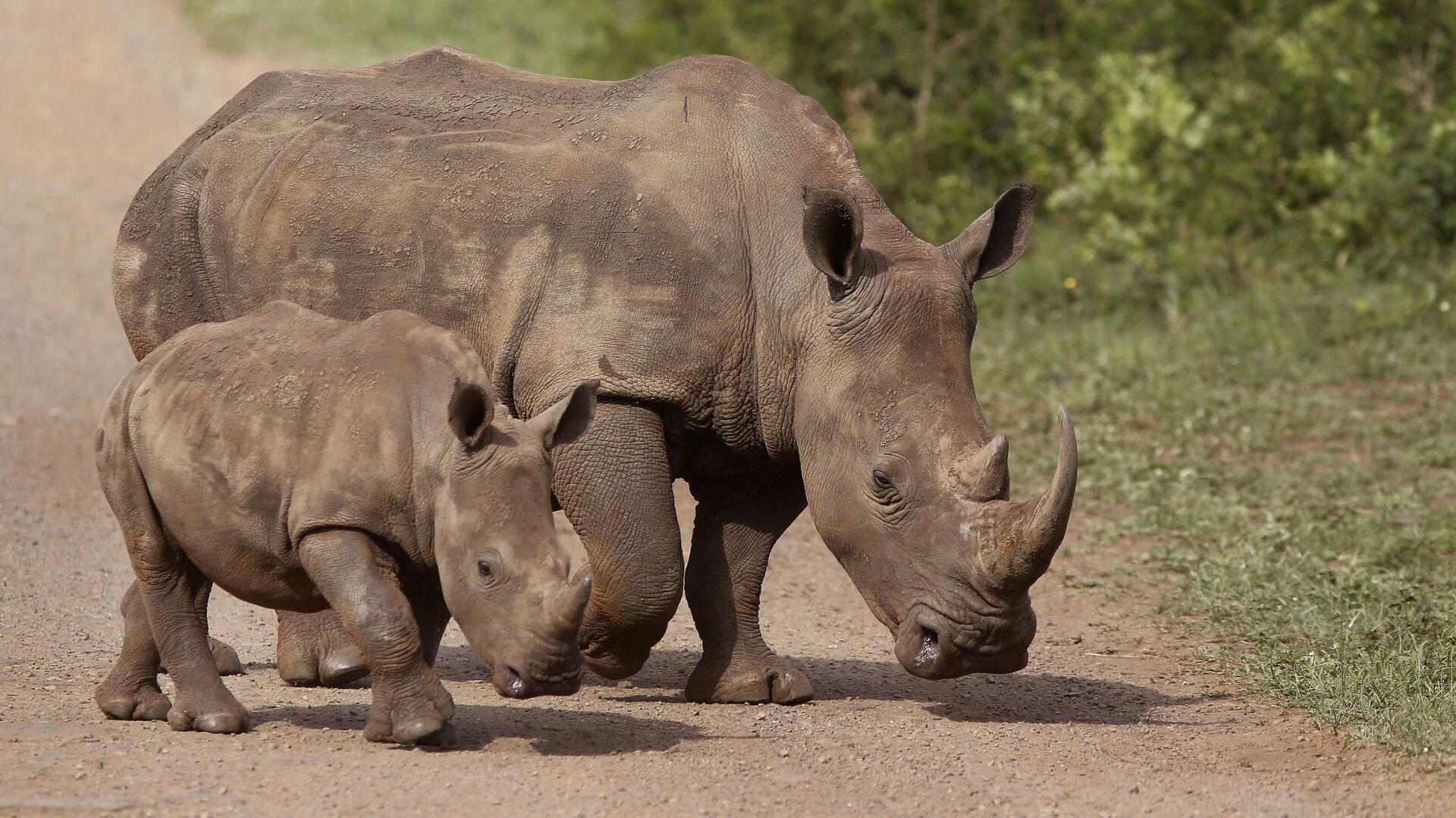https://sputnikglobe.com/20230209/decline-in-rhino-poaching-indicates-south-african-authorities-work-official-says-1107104611.html
Decline in Rhino Poaching Indicates South African Authorities' Work, Official Says
Decline in Rhino Poaching Indicates South African Authorities' Work, Official Says
Sputnik International
The statistics are beginning to show the results of the efforts South Africa makes in order to combat rhino poaching, says Albi Modise, head of Communications Office at the Department of Forestry, Fisheries, and the Environment.
2023-02-09T11:53+0000
2023-02-09T11:53+0000
2023-02-09T12:01+0000
africa
africa insight
south africa
southern africa
rhino
poaching
crime
police
wildlife
wildlife authorities
https://cdn1.img.sputnikglobe.com/img/07e7/02/09/1107106360_0:264:3172:2048_1920x0_80_0_0_e29b7dc00db66c655cbd1b34ae10c961.jpg
Statistics are beginning to show the results of the efforts South Africa and its foreign partners have taken to combat rhino poaching, says Albi Modise, head of the Communications Office at the Department of Forestry, Fisheries, and the Environment, South Africa, in a comment to Sputnik.Recently, the Department of Forestry, Fisheries, and the Environment stated that the yearly number of rhino poaching cases declined by three in 2022, totalling 448.According to the statement, Kruger National Park in the provinces of Limpopo and Mpumalanga in northeastern South Africa was the only national park to lose the animals last year. The number of poached rhinos in the park decreased by 40% compared to 2021 and amounted to 124.According to statistics by SANParks, the South African National Parks authority, the rhino population of the Kruger National Park, one of the largest wildlife reserves on the continent, declined by around 70% between 2008 and 2021, from around 10,000 to 2,800.In the country's privately owned reserves, a total of 86 rhinos were killed in 2022, the Department of Forestry, Fisheries, and the Environment said.Most poaching cases in 2022 occurred in KwaZulu-Natal province in the southeast of the country: 228 rhinos were killed in its provincial parks and 16 in private estates.Modise notes that the over the three past three years, the numbers of poaching cases has fluctuated. According to him, the COVID-19 pandemic offered some "breathing space", with the curtailment of movement between provinces and the closing of national parks meaning that the rhinos were in "a safer space." As a result, a total of about 394 rhinos were poached, he underlines, with the number rising to 451 in 2021 and decreasing again last year.According to Modise, South Africa utilizes several instruments in order to manage the problem. The country has a National Wildlife Strategy that involves the National Department of Environmental Affairs; provincial departments and the police are also actively involved, he notes, underlining the role of classification of poaching as a high priority crime. Modise adds that in 2022, South Africa "saw a total of about 132 arrests, with most of those arrests resulting in appearance in court by some of the accused."In December, it was reported that SANParks planned to include lie detector tests for game reserve staff as part of anti-poaching efforts.According to activist groups, one of the drivers behind rhino poaching is the demand for the animals' horns in several Asian countries, where the product is used for purposes of traditional medicine or as an item that reaffirms social status. As Modise notes, South Africa is engaged in international cooperation in order to tackle the problem.Modise notes that his country has memorandums of understanding on the issue with countries such as China, Vietnam, Laos as well as Mozambique. According to the official, combined efforts resulted in the arrests of the notorious Mozambican rhino poaching kingpin known as Navarra in Maputo (in a combined sting operation between the Mozambican authorities and the Wildlife Justice Commission) and a South African man at Changi Airport in Singapore, who was found in possession of 34 kilograms of rhino horns.Apart from rhino poaching, Africa faces the problem of illegal hippo hunts. The population of these animals, poached for their teeth, has seen an overall population decline of between 30% and 50% during the past decade. In November, it was reported that 10 African states signed a letter to the EU, accusing it of endangering the future of the species by refusing to accept a planned prohibition of the commercial trading of hippo products.
https://sputnikglobe.com/20221208/guterres-at-biodiversity-conference-calls-for-true-peace-pact-with-nature-1105175618.html
https://sputnikglobe.com/20230120/african-rhino-population-declining-in-state-run-parks-growing-on-private-lands-study-reveals-1106531776.html
africa
south africa
southern africa
Sputnik International
feedback@sputniknews.com
+74956456601
MIA „Rossiya Segodnya“
2023
News
en_EN
Sputnik International
feedback@sputniknews.com
+74956456601
MIA „Rossiya Segodnya“
Sputnik International
feedback@sputniknews.com
+74956456601
MIA „Rossiya Segodnya“
south africa rhinos, rhino poaching, hippo poaching, poaching decrease, africa wildlife
south africa rhinos, rhino poaching, hippo poaching, poaching decrease, africa wildlife
Decline in Rhino Poaching Indicates South African Authorities' Work, Official Says
11:53 GMT 09.02.2023 (Updated: 12:01 GMT 09.02.2023) South Africa is home to about 80% of the world's rhinoceros population, including the critically endangered black rhino species. Recently, the country's authorities declared that the number of rhino poaching cases – a problem that has long been troubling South Africa – marginally declined in 2022.
Statistics are beginning to show the results of the efforts South Africa and its foreign partners have taken to combat rhino poaching, says Albi Modise, head of the Communications Office at the Department of Forestry, Fisheries, and the Environment, South Africa, in a comment to Sputnik.
"The decline in the numbers over the past three years outside of COVID-19 is indicative of the work that we've been doing, the enforcement work on the ground, and the use of legislative framework," he notes.
Recently, the Department of Forestry, Fisheries, and the Environment stated that the yearly number of rhino poaching cases
declined by three in 2022, totalling 448.
According to the statement, Kruger National Park in the provinces of Limpopo and Mpumalanga in northeastern South Africa was the only national park to lose the animals last year. The number of poached rhinos in the park decreased by 40% compared to 2021 and amounted to 124.
According to statistics by SANParks, the South African National Parks authority, the rhino population of the Kruger National Park, one of the largest wildlife reserves on the continent, declined by around 70% between 2008 and 2021, from around 10,000 to 2,800.
In the country's privately owned reserves, a total of 86 rhinos were killed in 2022, the Department of Forestry, Fisheries, and the Environment said.
Most poaching cases in 2022 occurred in KwaZulu-Natal province in the southeast of the country: 228 rhinos were killed in its provincial parks and 16 in private estates.

8 December 2022, 06:07 GMT
Modise notes that the over the three past three years, the numbers of poaching cases has fluctuated. According to him, the COVID-19 pandemic offered some "breathing space", with the curtailment of movement between provinces and the closing of national parks meaning that the rhinos were in "a safer space." As a result, a total of about 394 rhinos were poached, he underlines, with the number rising to 451 in 2021 and decreasing again last year.
"Remember, South Africa is the home of the biggest rhino population. What it effectively means is that we have been conserving the rhino not just for South Africa, but for the global community," the official stressed. "And therefore, it's important that our efforts at home, using a plethora of legislative framework, the role of the police in terms of making sure that they detect and apprehend those who are involved, the work of the rangers on the ground who continue to disrupt the incursions into national parks, the responsibility that sits with different non-governmental organizations that have been supporting efforts on the ground to disrupt poaching activities."
According to Modise, South Africa utilizes several instruments in order to manage the problem. The country has a National Wildlife Strategy that involves the National Department of Environmental Affairs; provincial departments and the police are also actively involved, he notes, underlining the role of classification of poaching as a high priority crime. Modise adds that in 2022, South Africa "saw a total of about 132 arrests, with most of those arrests resulting in appearance in court by some of the accused."
"But also in national parks – we have seen with SANParks that they have introduced the dehorning of most of the rhinos as part of efforts to deter poachers on the ground. And we believe strongly that that particular dehorning has been working miracles, especially in making sure that it deters poachers in our areas that have been experiencing poaching," he says.
In December, it was
reported that SANParks planned to include lie detector tests for game reserve staff as part of anti-poaching efforts.

20 January 2023, 16:22 GMT
According to activist
groups, one of the drivers behind rhino poaching is the demand for the animals' horns in several Asian countries, where the product is used for purposes of traditional medicine or as an item that reaffirms social status. As Modise notes, South Africa is engaged in international cooperation in order to tackle the problem.
"Rhino poaching is part of the global illicit wildlife trade, which has been an area of concern to international parties. We as South Africa are members of the Convention on International Trade on Endangered Species (CITES). [...] Therefore, it's important to understand that because [illicit wildlife trade is] an internationally driven and fueled trade, [...] it therefore needs all of us internationally to work together to ensure that countries work collaboratively," he underlines.
Modise notes that his country has memorandums of understanding on the issue with countries such as China, Vietnam, Laos as well as Mozambique.
"Those agreements were primarily geared towards making sure that as and when there's been cases of rhino horns found and intercepted in any of those countries, that we have mechanisms in place to make sure that we are able to work together to trace their horns as to where they come from and be able to identify the parks where they might have been poached or even stolen from. And that's effective for us as to how we can best make sure that we deal with poaching activities at a global level," he adds.
According to the official, combined efforts resulted in the arrests of the notorious Mozambican rhino poaching kingpin known as Navarra in Maputo (in a combined sting operation between the Mozambican authorities and the Wildlife Justice Commission) and a South African man at Changi Airport in Singapore, who was found in possession of 34 kilograms of rhino horns.
"The South African government is working closely with Singapore authorities to investigate syndicates involved in that particular case," Modise says. "In relation to rhino prosecution, verdicts were handed down in 62 cases, which resulted in the conviction of 92 accused in rhino poaching activities with a conviction rate of 100%. It begins to indicate that much as there have been arrests, there's also been speedy and swift prosecution of the individuals involved in rhino poaching activities."
Apart from rhino poaching, Africa faces the problem of illegal hippo hunts. The population of these animals, poached for their teeth, has seen an overall population decline of between 30% and 50% during the past decade. In November, it was reported that 10 African states
signed a letter to the EU, accusing it of endangering the future of the species by refusing to accept a planned prohibition of the commercial trading of hippo products.




